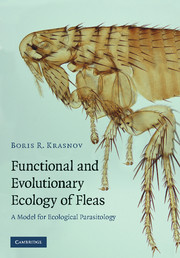Book contents
- Frontmatter
- Contents
- Preface
- Part I Brief descriptive ecology: what do fleas do?
- Part II Functional ecology: how do fleas do what they do?
- Part III Evolutionary ecology: why do fleas do what they do?
- 14 Ecology and evolution of host specificity
- 15 Ecology of flea populations
- 16 Ecology of flea communities
- 17 Patterns of flea diversity
- 18 Fleas, hosts, habitats
- 19 What further efforts are needed?
- References
- Index
15 - Ecology of flea populations
Published online by Cambridge University Press: 14 August 2009
- Frontmatter
- Contents
- Preface
- Part I Brief descriptive ecology: what do fleas do?
- Part II Functional ecology: how do fleas do what they do?
- Part III Evolutionary ecology: why do fleas do what they do?
- 14 Ecology and evolution of host specificity
- 15 Ecology of flea populations
- 16 Ecology of flea communities
- 17 Patterns of flea diversity
- 18 Fleas, hosts, habitats
- 19 What further efforts are needed?
- References
- Index
Summary
Charles Krebs defined ecology as ‘the scientific study of the interactions that determine the distribution and abundance of organisms’ (Krebs, 1994: 3). In other words, the main unit of ecological interest is not the individual organism but rather an assemblage of individuals belonging to the same species and coexisting in time and space. Contrary to that of most free-living species, spatial distribution of parasites is not continuous but consists of a set of more or less uniform inhabited ‘islands’ or patches represented by the host organisms, while the environment between these patches is decidedly unfavourable. In the majority of fleas, a ‘habitat patch’ also includes the host burrow or nest. This, however, does not negate the fragmented character of spatial distribution of an ensemble of conspecific fleas. This ensemble is fragmented amongst (a) host individuals; (b) host species within a location; and (c) locations. Strict terminology is required in order to distinguish between these different levels of fragmentation.
The scale involving host individuals does not represent a problem. An assemblage of parasites of a particular species inhabiting a particular individual host of a particular species is commonly defined as an infrapopulation (Margolis et al., 1982; Sousa, 1994; Combes, 2001; Poulin, 2007a). In contrast, there is no agreement regarding the terminology related to the host species and location (spatial) scales. Margolis et al., 1982; Sousa, 1994; Combes, 2001; Poulin, 2007a).
- Type
- Chapter
- Information
- Functional and Evolutionary Ecology of FleasA Model for Ecological Parasitology, pp. 321 - 374Publisher: Cambridge University PressPrint publication year: 2008



